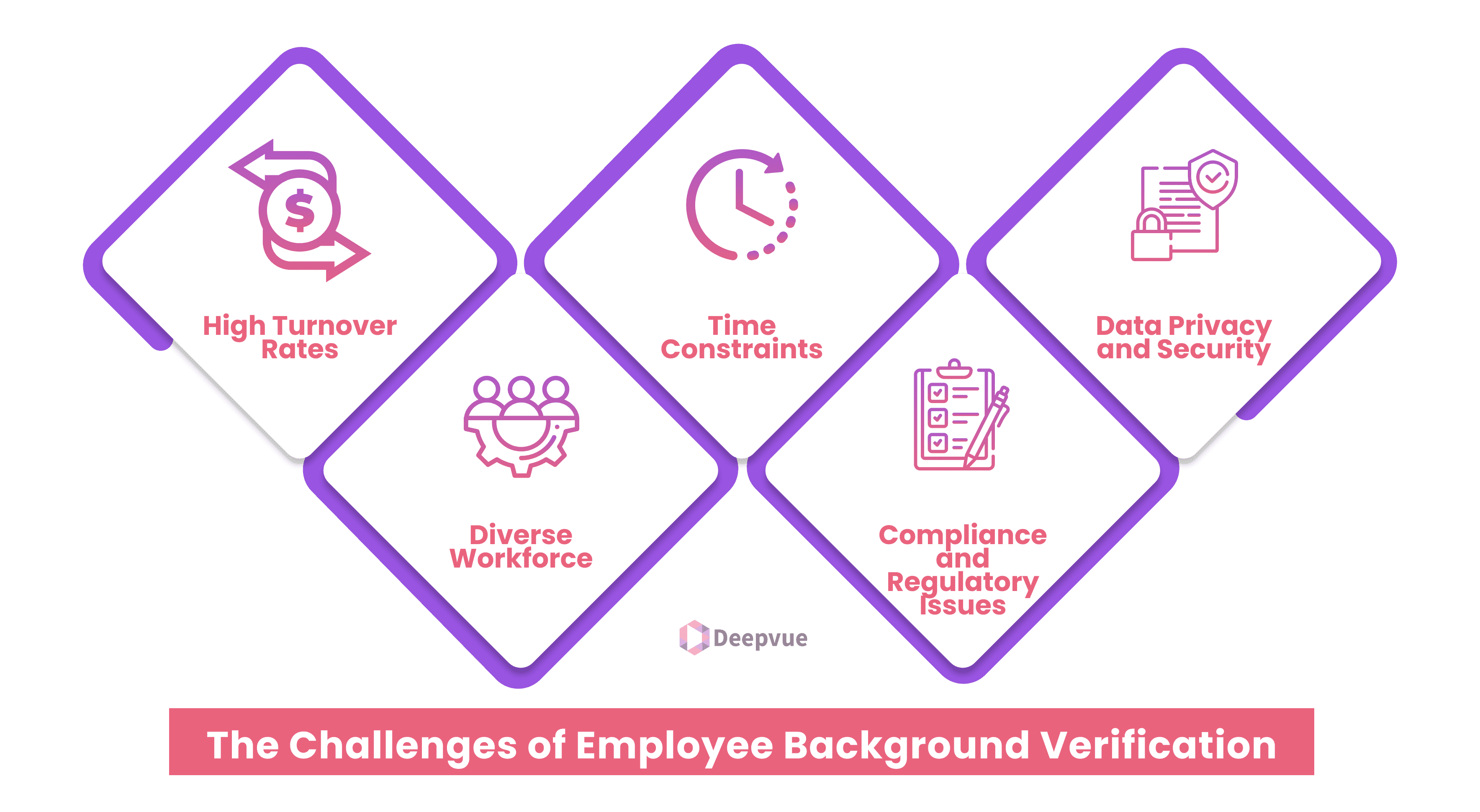Logistics is one of those high-stakes games in which every hire can have a ripple effect on the entire supply chain. With trucks moving at all times, packages piled, and fixed delivery times, logistics companies are highly reliant on the integrity, skill, and dependability of each employee. But making sure every new hire is up to the mark, that’s where it gets complicated.
Hiring in logistics is not only about hiring them fast. It’s about hiring the right group of people to handle valuable shipments and even heavy machinery without mistakes to deliver each time. Yet, the process of employee background verification comes with its own set of challenges, from regulatory twists and tight timelines to managing sensitive data.
In this blog, we’ll look at the top five hurdles logistics companies face when conducting background checks. From tackling high turnover to ensuring data security, let’s dive into how to make every hire a win for the industry!
Understanding Employee Background Verification
Employee background checks verify the background details and credentials of a subject employee. Thus, it includes verification of personal details such as employment history, qualifications, criminal records, and education. The bottom line is to ensure that the candidates are who they claim to be and possess the required qualifications for the job.
Importance of Background Checks in the Logistics Sector
In logistics, handling sensitive materials, heavy machines, and customers requires checking the backgrounds of employees to see if they meet the minimum set safety standards and are knowledgeable in what they do. Logistics employee verification can avoid any kind of liabilities for the organizations and add value to their reputation through the work staff being trustworthy.
The Challenges of Employee Background Verification

Challenge 1: High Turnover Rates
The logistics industry is characterized by notably high employee turnover, often exceeding 30% annually. Factors that contribute towards such turnover include seasonal fluctuations in demand, the physical nature of work, and stress brought about by fast-paced work environments. Such a situation, on its own, proves challenging for logistics employee verification:
- Increased Workload: HR departments are always recruiting new members to the organization; this increases workloads to ensure proper background checks are done.
- Quality vs Speed: The urgency to accelerate the filling of that position might strain the processing, and thus checking and verification can be relegated.
- Resource Allocations: Frequent hiring requirement creates much burden on HR resources and merely maintaining verification standards is hard.
Challenge 2: Diverse Workforce
The industry recruits very diverse groups of people from various backgrounds and regions. This diversity can make the workforce richer, but it complicates background verification:
- Varied Regulations: Different countries have different laws regarding background checks, which do not allow uniform verification across borders.
- Language Barriers: The language barrier may not enable effective communication in verifying qualifications or employment history, which may eventually be misunderstood.
- Cultural Differences: Cultural nuances may represent references and background information in different ways, and hence it is difficult to authenticate.
Challenge 3: Time Constraints
There is extreme pressure to hire fast in the logistics industry. In most cases, such a requirement goes against the need for a good background check. As an urgency to fill up positions moves ahead, several issues may prevail:
- Rushed Processes: Speed may overwhelm and background checks be held to the tee with relevant details being overlooked.
- False Information: A high-speed verification process might inadvertently allow an individual into the organization whose information contained in the report is incomplete or incorrect, thereby exposing the organization to risks of safety and compliance.
- Increased Liability: Failing to perform comprehensive checks can expose companies to legal liability in case of incidents involving unqualified hires.
Challenge 4: Compliance and Regulatory Issues
Logistics companies deal with a somewhat complex regulatory arena, comprising a multitude of safety and transportation regulations plus labor laws. Compliance with such regulations is critical but does add complexity to the process of logistics employee verification:
- Evolving Regulation: Compliance requirements may sometimes change frequently, thus requiring constantly updated hiring practices and employee background verification procedures.
- Variety of Standards: Companies operating in different geographical areas tend to be exposed to varying rules concerning background checks, thus posing difficulty in presenting standard approaches.
- Potential Penalties: The penalties can be pretty brutal too. In addition to financial and reputational penalties, legal lawsuits may also arise in case of non-compliance.
Challenge 5: Data Privacy and Security
With the increasing concerns over data breaches and violations of privacy, data protection has to take precedence in the verification of employees particularly in background checks in these dimensions:
- Sensitive Information: It deals with sensitive personal data that need to be protected as much as possible using all available security measures.
- Compliance with Privacy Laws: Regulations such as the Digital Personal Data Protection (DPDP) Act, 2023, General Data Protection Regulation (GDPR) and the California Consumer Privacy Act (CCPA) impose strict requirements on how personal data is handled.
- Reputation Risk: Breach of candidate data would result in reputational risk, erosion of trust, and more legal implications.
Best Practices for Effective Background Verification
Best practices that may be used in navigating employee background verification in the logistics industry include:
- Streamline the Verification Process
Streamlined identity verification can help logistics companies easily manage the influx of candidates while maintaining thoroughness. This may involve creating standardized procedures with their corresponding checklists for verifying different aspects during a background check may be implemented across all hires.
- Leveraging Technology and Automation
Technology can be used to speed up and make more accurate background checks. An automated system may help trace and manage the logistics employee verification process, thus reducing the time and effort in doing the manual checks.
- Partner with Third-Party Verification Services
Third-party background verification specializes in holding checks, and they even keep up with the best knowledge about the legislation, thereby leaving logistics to focus on their core jobs.
Last Stop: Steering Clear of Background Check Pitfalls
Employee background verification is an important aspect of a safe and productive logistics operation. High staff turnover rates, ethnically diverse mixes of employees, limited time, compliance, and private data are all significant factors that affect this industry. Layered on top of that are the issues of handling sensitive information.
And here is where our Identity Verification API comes in. Our API will make it fast, easy, and secure for logistics companies to verify employee information. This means instant access to identity data for companies that onboard quickly without sacrificing safety or accuracy. Plus, candidate data is kept secure so you can check off all the privacy requirements with ease.
FAQ:
Why is logistics employee background verification important?
Logistics workers require a background check to guarantee they are trustworthy, dependable, and competent. Given the high-value cargo and regulatory compliance requirements, rigorous screenings reduce theft, fraud, and safety hazards.
What are frequent background verification issues?
High turnover, diverse staff, time-bound limitations, compliance, regulatory challenges, and data security and privacy issues are some of the common issues.
How does high turnover affect background checks?
HR departments must do additional background checks due to high turnover. Urgency might lead to hasty methods that undermine verification accuracy.
What regulations should logistics businesses know about background checks?
Logistics businesses must understand local background check laws. This involves keeping up with compliance changes and following local hiring rules.
How can logistics businesses speed up background checks?
Standardizing protocols, automating processes, and working with background check specialists help speed background verification for logistics firms.








